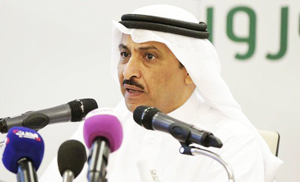Riyadh, Apr 19: Ahmed Al-Humaidan, deputy minister of labor and social development, said the labor market is going through a pivotal stage and has structural problems that have accumulated over the past 40 years.

He said the ministry is working through mechanisms that are agreed upon within the national transformation program including the balance between education graduates and the labor market.
The ministry said earlier that it aimed to reduce the unemployment rate from 12.1 percent to 9 percent, and boost the percentage of women in the workforce to 29 percent by 2020 through its Nitaqat nationalization program.
The program seeks to increase the number of Saudis in the labor market through changing the Saudization percentage, which companies are required to maintain.
High percentage of Saudization in a given entity in turn qualifies that entity to obtain a range of incentives by the Human Resources Development Fund (HRDF or HADAF).
Establishments that offer good packages to Saudis are eligible for HRDF support programs based on their accomplishment of the required points which are calculated under the “guided support program.”
These include nationalization rate, average wage of Saudis, percentage of Saudi female staff, job stability and percentage of Saudis with high salaries.
A recent report by the General Authority for Statistics showed women represented 80.6 percent of registered job seekers, indicating a problem in accommodating a qualified female workforce in both public and private sectors.
The report showed that women continue to search for jobs up to the age of retirement; given that 3,488 women ages 57 to 66 were still registered as job seekers. There were only 167 male job seekers in the same age group.
AddThis Sharing Buttons
Share to FacebookShare to TwitterShare to Google+Share to WhatsAppShare to Reddit







Comments
Add new comment